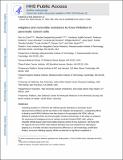| dc.contributor.author | Chen, Pan-Yu | |
| dc.contributor.author | Muzumdar, Mandar | |
| dc.contributor.author | Dorans, Kimberly | |
| dc.contributor.author | Robbins, Rebecca | |
| dc.contributor.author | Bhutkar, Arjun | |
| dc.contributor.author | Del Rosario, Amanda M | |
| dc.contributor.author | Mertins, Philipp | |
| dc.contributor.author | Qiao, Jana | |
| dc.contributor.author | Schafer, Anette Claudia | |
| dc.contributor.author | Gertler, Frank | |
| dc.contributor.author | Carr, Steven A | |
| dc.contributor.author | Jacks, Tyler E | |
| dc.date.accessioned | 2020-03-30T15:10:30Z | |
| dc.date.available | 2020-03-30T15:10:30Z | |
| dc.date.issued | 2017-12 | |
| dc.date.submitted | 2017-11 | |
| dc.identifier.issn | 0008-5472 | |
| dc.identifier.issn | 1538-7445 | |
| dc.identifier.uri | https://hdl.handle.net/1721.1/124410 | |
| dc.description.abstract | Activating mutations in KRAS are the hallmark genetic alterations in pancreatic ductal adenocarcinoma (PDAC) and the key drivers of its initiation and progression. Longstanding efforts to develop novel KRAS inhibitors have been based on the assumption that PDAC cells are addicted to activated KRAS, but this assumption remains controversial. In this study, we analyzed the requirement of endogenous Kras to maintain survival of murine PDAC cells, using an inducible shRNA-based system that enables temporal control of Kras expression. We found that the majority of murine PDAC cells analyzed tolerated acute and sustained Kras silencing by adapting to a reversible cell state characterized by differences in cell morphology, proliferative kinetics, and tumor-initiating capacity. While we observed no significant mutational or transcriptional changes in the Kras-inhibited state, global phosphoproteomic profiling revealed significant alterations in cell signaling, including increased phosphorylation of focal adhesion pathway components. Accordingly, Kras-inhibited cells displayed prominent focal adhesion plaque structures, enhanced adherence properties, and increased dependency on adhesion for viability in vitro. Overall, our results call into question the degree to which PDAC cells are addicted to activated KRAS, by illustrating adaptive nongenetic and nontranscriptional mechanisms of resistance to Kras blockade. However, by identifying these mechanisms, our work also provides mechanistic directions to develop combination strategies that can help enforce the efficacy of KRAS inhibitors. Keywords: Pancreatic cancer; cell adhesion; cell signaling; protein tyrosine kinases; animal models of cancer; gene expression profiling; oncogenes; tumor suppressor genes; gene products as targets for therapy; novel mechanisms | en_US |
| dc.description.sponsorship | NCIK08 Award | en_US |
| dc.description.sponsorship | KL2/Catalyst MeRIT award | en_US |
| dc.description.sponsorship | CCF/ASCO Young Investigator Award | en_US |
| dc.description.sponsorship | Lustgarten Foundation Consortium grant | en_US |
| dc.description.sponsorship | Blum-Kovler Pancreatic Cancer Action Network-AACR Innovative grant | en_US |
| dc.description.sponsorship | Department of Defense Congressionally-Directed Medical Research Program (Grant W81XWH-12-043) | en_US |
| dc.description.sponsorship | National Cancer Institute. Cancer Center Support (Grant P30-CA14051) | en_US |
| dc.language.iso | en | |
| dc.publisher | American Association for Cancer Research (AACR) | en_US |
| dc.relation.isversionof | http://dx.doi.org/10.1158/0008-5472.can-17-2129 | en_US |
| dc.rights | Creative Commons Attribution-Noncommercial-Share Alike | en_US |
| dc.rights.uri | http://creativecommons.org/licenses/by-nc-sa/4.0/ | en_US |
| dc.source | PMC | en_US |
| dc.title | Adaptive and Reversible Resistance to Kras Inhibition in Pancreatic Cancer Cells | en_US |
| dc.type | Article | en_US |
| dc.identifier.citation | Chen, Pan-Yu et al. "Adaptive and Reversible Resistance to Kras Inhibition in Pancreatic Cancer Cells." Cancer Research 78, 4 (February 2018) © 2017 American Association for Cancer Research. | en_US |
| dc.contributor.department | Massachusetts Institute of Technology. Department of Biology | en_US |
| dc.contributor.department | Broad Institute of MIT and Harvard | en_US |
| dc.contributor.department | Koch Institute for Integrative Cancer Research at MIT | en_US |
| dc.relation.journal | Cancer Research | en_US |
| dc.eprint.version | Author's final manuscript | en_US |
| dc.type.uri | http://purl.org/eprint/type/JournalArticle | en_US |
| eprint.status | http://purl.org/eprint/status/PeerReviewed | en_US |
| dc.date.updated | 2019-12-05T14:47:10Z | |
| dspace.date.submission | 2019-12-05T14:47:12Z | |
| mit.journal.volume | 78 | en_US |
| mit.journal.issue | 4 | en_US |
| mit.metadata.status | Complete | |
